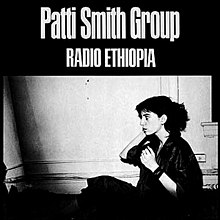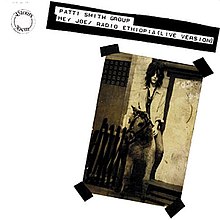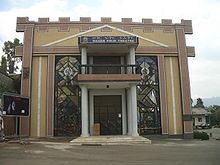Radio Ethiopia is an album by the Patti Smith Group. It released in October 1976 through Arista Records.
History

Radio Ethiopia was the follow-up record to Smith's widely acclaimed debut Horses. In interviews surrounding the album's release, Smith explained that she chose producer Jack Douglas in hopes of making the album a commercial success. The album was negatively received when it was released and Smith was attacked by critics for what they perceived to be laziness, self-indulgence and selling out.
The title track of the album is one of Smith's most notorious songs, almost legendary for appearing to be "10 minutes of noise". Critics often described live renditions of the song as negative moments of Smith's concerts. Patti herself spoke highly of the track and of how the lyrics refer to Arthur Rimbaud's dying wishes. Arguments both for and against the song have been advanced by critics, fans and music listeners over whether the song truly is an example of the Patti Smith Group's boundary-pushing or merely self-indulgence. Critics in negative reviews cited that Douglas' production placed more emphasis on creating a heavy sound through numerous guitar parts which smothered Smith's vocals and, at times, lamented that all of the album's songs were originals of the group (Smith co-wrote much of the album with bassist Ivan Kral, the band member keenest for commercial success ). "Ain't It Strange" and "Distant Fingers", the latter co-written with Smith's long-time boyfriend Allen Lanier, had both been staples of the Group's concerts long before the recording of Horses.
The album's cover photograph is by Judy Linn, the back of the album features a photo by Lynn Goldsmith. The album was dedicated to Arthur Rimbaud and Constantin Brâncuși. The back cover of the album bears the legend: "Free Wayne Kramer", who at the time was incarcerated in Kentucky following his conviction for dealing cocaine. "Pissing in a River" was released as a single the same year. It was also featured in the 1980 movie Times Square.
In 2001, the album listed in Mojo's "Ultimate CD Buyers Guide".
Critical reception

Allmusic critic William Ruhlmann described the record as "a schizophrenic album in which the many elements that had worked so well together on Horses now seemed jarringly incompatible", Ruhlmann also noted that "Patti Smith Group learned their craft and competence set in and lost some of the unself-consciousness that had made their music so appealing." Music critic Robert Christgau stated that the album's sound "delivers the charge of heavy metal without the depressing predictability; its riff power has the human elan of a band that is still learning to play." Rolling Stone critic Dave March wrote: "Smith seems to lack the direction necessary to live up to her own best ideas."
Track listing

"Radio Ethiopia" and "Abyssinia" were recorded live on 9 August 1976.
Bonus track (1996 CD reissue)
-
- "Chiklets" (Smith, Kral) â€" 6:23
Personnel
Band
- Patti Smith â€" vocals, guitar (Fender Duo-Sonic), design
- Lenny Kaye â€" guitar (Fender Stratocaster), bass, vocals, mixing
- Jay Dee Daugherty â€" drums, percussion, mixing, consultant
- Ivan Kral â€" bass, guitar
- Richard Sohl â€" keyboards, synthesizer, piano
Additional personnel
- Jack Douglas - Production
- Bob Irwin â€" mastering
- Brian Sperber â€" engineering
- George Marino â€" mastering
- Jay Messina â€" mixing, engineer
- Lynn Goldsmith â€" photography
- Nancy Greenberg â€" design
- Rod O'Brien â€" assistant engineer
- Sam Ginsberg â€" assistant engineer
- Vic Anesini â€" mastering
Charts
Release history
Notes
External links
- Radio Ethiopia at AllMusic

